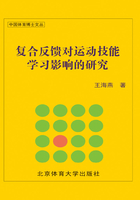
ABSTRACT
Physical fitness test showed that university students' physique still declining, so how to improve the quality of physical education and then improving the university students' physique is the focus of university sports research. Feedback can not only provide the information to the learners, but also promote stuendents learning motivation, so it plays an important role in motor skill learning. From previous researches, our country's theoretical study on feedback is not so systematic and we are even in its infancy on the cutting-edge of feedback research. In addition, as it is harder to implement reseach on physical education class than in lab, the applying of feedback into physical education is even less. So the article reviews the generation, evolution and development of feedback theory, and then highlights the latest developments of the feedback research area—attention focus, observation learning and self-control feedback. Then the article uses mate-analysis method which is seldom used in sport training field to analyze 95 observation learning articles and 29 self-control feedback articles and choose 134 and 26 index separately, and fi nally evaluate their overall infl uence on skill learning. Then the article use the conclusion derived from the meta-analysis, and combined it with disciplines of education and systems theory's theory, and proposed the composite feedback. Then the article states the mechanism of composite feedback on motor skill learning and applied the composite feedback theory into the physical education of table tennis, in order to provide some theretic and practicing references on using mate-analysis in sports fi eld and the feedback theory in physical education. Conclusions:
1. The meta-analysis of observational learning showed that:(1)Observational learning can improve the skill learning significantly;(2)Observational learning is better in promoting the learning of the action technical and movement cognitive characteristics than movement outcome;( 3)Observed a high level / standard model is more beneficial in skill learning than the beginner demonstration;(4)Observational learning is more beneficial to the skills involved big muscles;(5)Live demonstrations, video and Point-light model shows no signifi cant impact on observational learning, but some studies show that the point-light model is not as effective as live and video demonstration.
2. The meta-analysis of self-controlled feedback showed that:(1)Self-control feedback can significantly promote skill learning;(2)Self-controlled use of the device and watch video is better in facilitating skill learning than self-control verbal feedback;(3)The frequency of self-control feedback is depending on the diffi culty of the tasks, and the more complex the task, the higher feedback frequency it needs.
3. The composite feedback theory which is the integration of extrinsic feedback and intrinsic feedback can promote skill learning through the interaction of four stages :the guide of observation phase, Imitation and practice stage, self-monitoring and direct stage and self-regulation phase. The overall effect size of composite feedback on skill learning is 1.05 which indicating that the composite feedback is better in promoting skill learning than the simple feedback. In addition, the composite feedback is better in facilitating the table tennis ball precision and technical evaluation than the rallies. In addition, the overall effect size of composite feedback on students' satisfaction is 1.01, which means that the composite feedback can effectively improve the students' overall satisfaction. And composite feedback is better in promoting students' self-efficacy and effort than the satisfaction of improvement of technology and happiness when taking the table-tennis class.
Keywords:Meta-analysis; Composite feedback; Observational learning; Self-controlled feedback; Feedback